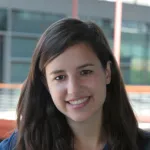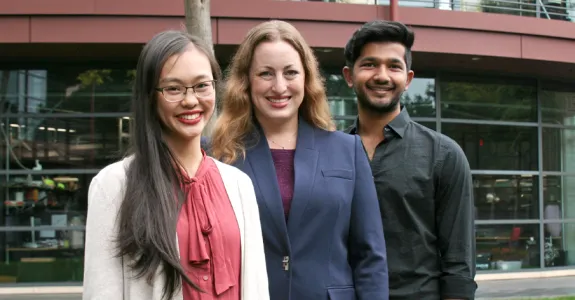
Home Department: Biology (Neurobiology)
Supported by: Bio-X
Mentor: Michelle Monje, Assistant Professor of Neurology, of Neurosurgery, and of Pediatrics
Andrea Goldstein, a rising junior, plans to major in biology with a specialization in neuroscience. This summer in Michelle Monje's lab, she is using optogenetics to stimulate the motor cortex and major motor pathways of developing mice in an attempt to influence the generation of new glial cells in the specific area of stimulation. In the future, she hopes to study whether this localized stimulation can reverse the damaging effects of chemotherapy and radiation on glial cell populations and the subsequent deficits in neurocognition including learning, memory, attention, and speed of information processing.
Poster presented at the Stanford Bio-X Interdisciplinary Initiatives Symposium on August 27, 2012:
The Role of Neuronal Activity in Oligodendrocyte Precursor Cell Proliferation and Differentiation
Andrea Goldstein1, Erin Gibson1, Michelle Monje1
[Department of Neurology1, Stanford University]
Home Department: Biology (Neuroscience)
Supported by: Pitch Johnson
Mentor: Matthew Scott, Professor of Genetics, Bioengineering, and of Developmental Biology
Andrea Goldstein, a student from St. Louis, Missouri, recently finished her freshman year at Stanford University. She is hoping to major in biology with a specialization in neuroscience and has been fascinated by science and the medical field since the age of seven. She plans to pursue such fields in the future. This summer in Matthew Scott’s lab, she is studying various neuropeptides in the Drosophila melanogaster brain and the subsequent effects of these peptides on insulin secretion and growth.
Poster presented at the Stanford Bio-X Interdisciplinary Initiatives Symposium on August 17, 2011:
Elucidating the Role of Candidate Genes in Drosophila Insulin Secretion and Growth Regulation
Andrea Goldstein1, Julie Ni1, Matthew Scott1,2,3
[Departments of Developmental Biology1, Genetics2, and Bioengineering3; Stanford University]



